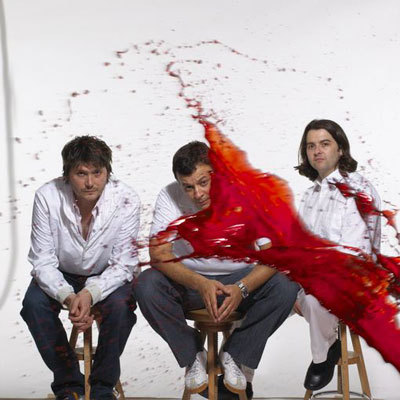1) 1985; 2) The Love of Richard Nixon; 3) Empty Souls; 4) A Song for Departure; 5) I Live to Fall Asleep; 6) To Repel Ghosts; 7) Emily; 8) Glasnost; 10) Solitude Sometimes Is; 11) Fragments; 12) Cardiff Afterlife
Introspective and calm, the normally fiery band lock themselves in the studio and purge their demons out via production wizardry - unexpectedly creating one of their purest, finest moments.
Key tracks: "1985", "I Live to Fall Asleep", "Solitude Sometimes Is"
The sadly now defunct Finnish music review site RockMusica was one of the places that gave the mixedly received Lifeblood a glowingly positive review. The review concluded with a short statement about the album’s nature, one that has for whatever reason made a permanent home in my head to the point that I wish I had written it. Quoting, paraphrased: Lifeblood is an album where three men first looked at themselves from a mirror, then they looked at each other and finally proceeded to write an album about what they saw.
Lifeblood is an obvious oddball in the Manic Street Preachers catalogue. They have always been a band who have believed in the power of rock music and the almighty guitar - not necessarily a bad thing as James Dean Bradfield is one of the best guitarists around - but on Lifeblood the familiar Bradfield riffs and melodies have been pushed under layers of keyboards and synthesizers, the amount and scale of his traditional solos have been suppressed to almost nothing and whilst the guitar is a constant presence, it’s used to a much subtler effect to the point that few of the tracks only reveal their guitar parts if you really pay attention to what’s going on in the background. The sound of the album is generally cold, detached - you could argue it’s sterile - much like the pure, clear white that’s prominent in the artwork and which the band wrapped themselves in during the era. In some tracks it’s hard to tell whether Sean Moore is behind the drumkit or instead working his beats in front of a computer program. From a band who often seem almost embarrassed to try something completely different, Lifeblood is a bizarre recording. It’s no wonder that it’s become one of the albums that the band tries to hide away from public sight, talking about it slightly derivatively if at all and when they do actually give it a compliment, they mumble through it sheepishly. It’s not an album that makes sense.
It is slightly ironic then that out of all their albums, Lifeblood might just be their most personal one.
As a band, the Manics have always thrived on reactions. Much of their discography can be interpreted as a reaction to something: whether against their work just prior (Know Your Enemy, The Holy Bible to an extent) or the personal context around them (Everything Must Go, This Is My Truth Tell Me Yours). Such a reactionary attitude is part of what makes the band so great: it’s lead to a stylistically varied discography that’s a joy to dig in when you first become a fan, never knowing what to really expect. But in this context, Lifeblood is the odd one out. It doesn’t fit the cycle of action and reaction. It was recorded and released a short time after the band had spent time taking a retrospective look at their career and closing one chapter of it through the release of a greatest hits and a rarities compilation. They were, in a way, back to square one.

Amusingly, for an album that was meant to bid farewell to the past its central themes are centered around history. Lifeblood is an album about loss and the significance of time passing. Wire’s lyrics are full of contemplation about life going by and changing things, whether it’s personal (reminiscing about the band’s beginning in “1985” or reflecting on how long it’s been since those days and how much one has changed during the years in “Glasnost”) or elaborating on the stories of others whose actions have been lost in time (“The Love of Richard Nixon” makes a point about Nixon’s positive work being forgotten after the Watergate scandal while “Emily” comments on how Wire feels Emmeline Pankhurst has been forgotten in way of feminist icons he finds less important). Wire’s frequent buzzline at the time was that Lifeblood was “The Holy Bible for the 35-year-olds”: dark and troubled, but replacing the fury and anger of young men with the world-weary desire to let go and move on as felt by a grown man who’s witnessed that nothing he says has no effect to anyone but himself.
At this point it’s probably a good time for me to talk about the personal context for this album. This is a five-star, 10/10 album for me: by my personal definition, perfect top-score albums like this are ones that have had a deep, personal impact on me at one point in time and which always bring up that significance every time I listen to them. The gist is, I can’t talk about Lifeblood without that personal angle. Manic Street Preachers are one of my favourite groups of all time - once upon a time I could have said with confidence that they were the very favourite, in fact (and that “drop” in ranking isn’t a slight against the band). I became a fan of theirs sometime in the early 00s and Lifeblood was the first new studio release they released after that. My first touches of stalking what artists do through the internet are related to Lifeblood - hearing radio rips of new songs that UK fans posted on forums I lurked to, checking several websites for any new nuggets of info, etc. If there was a single moment where it became obvious that I had found something personal and special with the Manics, it was the joyous on-the-spur bouncing that happened in my room to the chorus of “1985” during the very first time I started playing the album on the cool winter’s day it was released.
But why Lifeblood still matters is that it’s an album that never lost that same spark for me. If anything, over the years it’s become something much more. It’s an album that’s been with me through thick and thin, through good and the bad and through all the changes I’ve been through. It’s become a close friend. It got to the point that when I started spotting new details on these songs that I had heard a countless times before, I started to feel a sense of overjoyed discovery no matter how insignificant that detail might have been in the greater scheme of things. With each new discovery it felt like I was hearing the songs brand new once again, and somehow they felt even closer to me than ever before.

All this - the details, the feeling of loss and world moving on and the personal impact - is contained in twelve 3-4 minute glacial pop/rock elegies. All 12 songs of Lifeblood are immaculate, immense songs, many of which easily belong to the proud company of Manics’ greatest moments and the rest wouldn’t be far off. Despite the everpresent melancholy and weariness in the sound, there is an audible contentment running throughout the album - the band may be working outside their comfort zone, but they sound perfectly at ease being there, playing with a clarity of vision and natural flow the likes of which has rarely been present in their albums. New things are tried and everything works out excellently, be it James bringing out an e-bow for the first time (“Empty Souls”), experimenting writing music first and coming up with words afterwards contrary to the band’s usual working method (the rather more abstractly worded “Always/Never”), or - of all things - bringing a slap bass into a Manic Street Preachers song (also “Always/Never”, and for the record it’s brilliant).
The list of highlights goes on. “1985” is a Manics classic through and through, an absolutely incredible anthem that resonates with the power of a band at their greatest. “I Live to Fall Asleep” is tender, graceful and heartachingly wistful. The twinkling “Solitude Sometimes Is” builds bit-by-bit in intensity, growing from an introspective whisper to a shout against the world. “Fragments” is a hazy winter’s daydream, slowly bouncing along its jittery percussions and loopy organ in a hypnotic manner until it breaks into a swooning soar. “The Love of Richard Nixon” is a bizarre twist on a pop song, distant emotionally from the rest of the album as well as a shocker of a lead single (and honestly, the utterly wrong choice), but once the off-kilter double-tracked vocals and synthetic thrust wear off their shock factor, it reveals itself to be an earworm of an arrow hitting straight into a bullseye. “To Repel Ghosts” brings back the edge and the fury with an appropriately haunted atmosphere full of echo. The punchy “A Song for Departure” (both Moore and Wire were instructed to play their instruments like in “Beat It”, leading to the song’s backbone groove), the colossal and glacial “Empty Souls” and the warm nostalgic sunshine of “Glasnost” are majestic stadium moments that still bear their hearts openly; “Emily” and “Cardiff Afterlife” gently wrap their fingers around the listener as they sink into their resigned yet beautiful atmosphere. “Always/Never” is a dreamy funk trip that reveals a new dimension with each listen.
I make it a point to never do song-by-song lists in my reviews as they’re a crawl to read through, but these songs deserve the mentions. They all do. These are special songs packed with excellent lines, brilliant melodies and which reveal worlds about their creators despite coming off almost cold and aloof at first thanks to how their sound. They are both bold and fearless yet vulnerable and intimate, with no amount of production layers disguising how this is one of the few moments in Manics’ discography where no one else mattered but the band themselves. It feels vital - it was vital for the band to create it and to get it ouf of their system, and it’s become vital for me as a music listener. It’s a keystone album in my personal history and I am utterly biased about its strengths - and yet, even when attempting to listen to it more objectively it feels like the band truly tapped onto something special when they shed their familiar skins that one time.

No comments:
Post a Comment